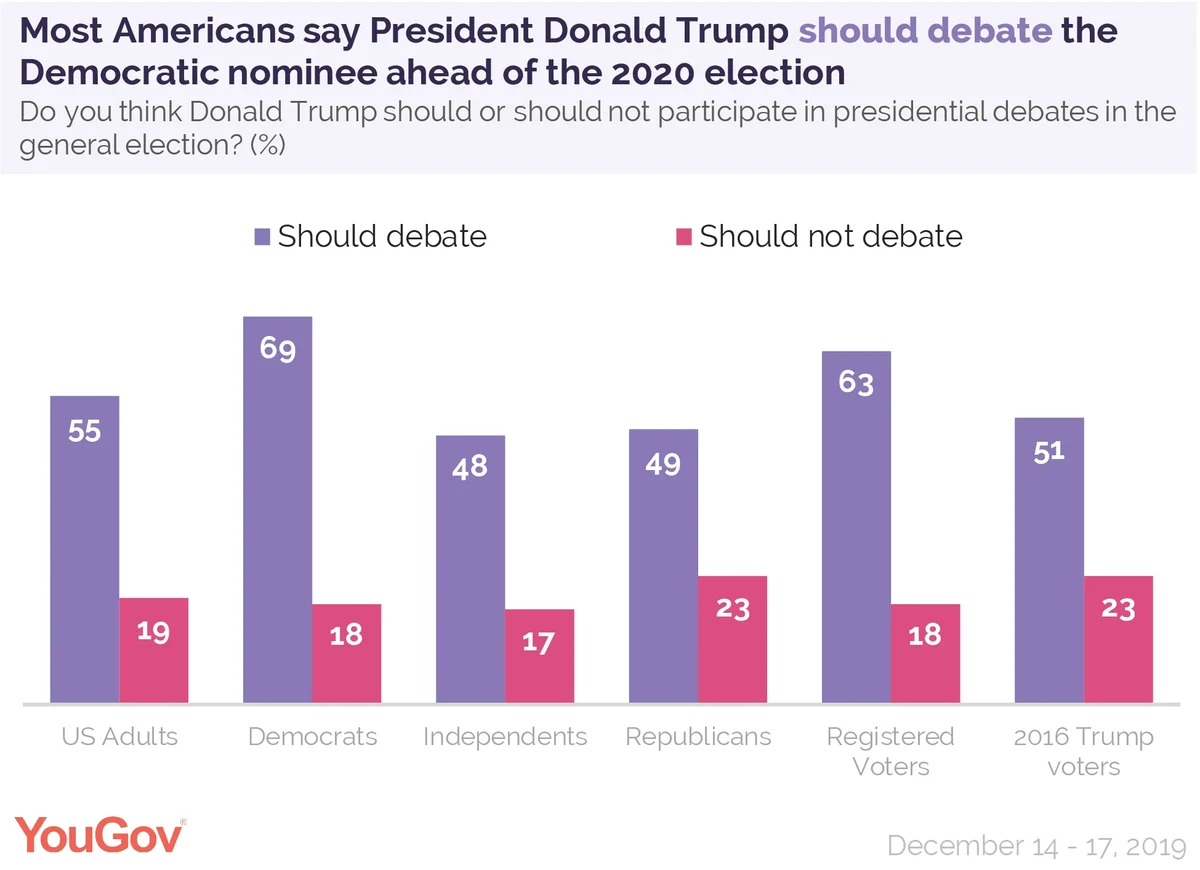Americans, for the most part, want political candidates to debate one another ahead of deciding who to vote for in the 2020 general election.
That makes President Donald Trump’s recent suggestion that he may not want to debate come next fall a dubious one. In tweets and discussions at the White House, the president indicated that he may not participate in any debates organized by the Commission on Presidential Debates, but according to the public, he should debate.

Half of Republicans (52%) believe the president will debate the eventual Democratic nominee, while Democrats are skeptical. Both Republicans and Democrats think President Trump should debate, although the GOP margin is narrower. Those who think the president should not debate believe he won’t participate, 43 to 31 percent. But by 46 to 31 percent, those who think he should participate in the fall debates believe he will.
But that debate potential debate between Trump and a still unknown candidate is a ways off. The Democrats have a debate this week.
Although most Democratic voters say they are interested in it, less than half say they expect to watch, fewer than said this before the last debate. This time around, there is no clear consensus on which of the seven qualified candidates voters expect will do best among the smaller debate group.
The largest share of Democratic primary voters select Massachusetts Senator Elizabeth Warren as the candidate likely to win, but nearly as many pick Vermont Senator Bernie Sanders and former Vice President Joe Biden as the likely winner.
The smaller number of participants may not sit well with some Democratic voters: just as many (44%) say all the candidates still in the race should be allowed to participate as support the limits on participation (42%).
African-Americans and people in the Midwest, as well as those who haven’t been paying a lot of attention to the campaign, are especially likely to want all the candidates to participate.
As of now, Biden remains the most popular first choice of all Democratic candidates, and by a double-digit margin. Sanders and Warren are close to each other in second and third place. South Bend Mayor Pete Buttigieg follows with Minnesota Senator Amy Klobuchar and former New York City Mayor Mike Bloomberg (who will not be in the debate) next.
Biden is far ahead with African-American voters, as he has been, while Sanders (the oldest candidate) does best with the youngest voters. Warren remains the most popular second choice: nearly one in five Democratic voters (18%) choose her. They come to her from all candidates, but especially from Sanders. Nearly half of Sanders supporters say Warren is their second choice. That doesn’t work in reverse. Only 17% of Warren’s supporters say Sanders is their second choice.
Three-quarters of Democratic voters have a favorable opinion of Warren, more than say that about any other candidate.
Only 20 percent are unfavorable. Just 15 percent say they would be disappointed if Warren became the nominee, lower than the percentage that say that about any of the other candidates who will be in this week’s debate.
Democratic disappointment, however, would be greatest about several trailing candidates not participating this week: 38% would be disappointed if Marianne Williamson or Hawaii Representative Tulsi Gabbard became the nominee, while 31 percent say they would feel that way if Bloomberg won the nomination. Gabbard and Williamson both receive negative overall evaluations from Democratic voters (47% in this poll are unfavorable to Gabbard, while 26% are favorable; for Williamson, the comparable percentages are 41% and 24%).
Democratic voters are closely divided on Bloomberg, though his evaluations have improved in the last week. Last week, 36 percent had a favorable opinion about Bloomberg, while 45 percent were not; this week, 41 percent are favorable and 44 percent are not.
Related: Impeachment is making Democrats nervous
See the toplines and table results from this week’s Economist/YouGov poll
Image: Getty














